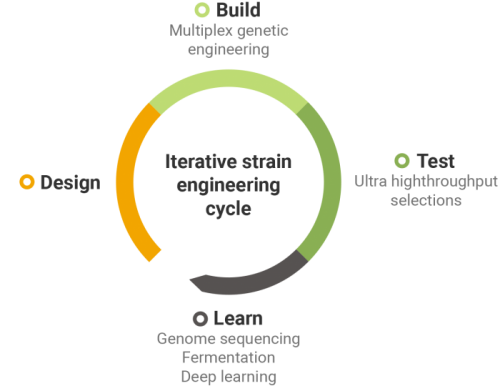Two startups in the fields of synthetic biology, Biosyntia and FGen, have struck a partnership to identify promising microbial strains. The objective is to find a strain that enables bioproduction of a B vitamin.
The driving force of this new partnership between Biosyntia, Denmark, and FGen, Switzerland, seems to be the combination of their innovative screening abilities. Biosyntia relies on metabolic engineering and biosynthetic selection, redefining the rules of the strains’ evolution. Its strategy has earned it accolades like top 5 most innovative small Biotechs in Europe and best European startup.
FGen is also active on strain development but focuses instead on high-throughput screening. It develops the nanoliter-reactor platform, which can evaluate the performance of a given strain in a droplet of liquid and at a rate of 1 million cells per day. FGen was founded in 2011 in Basel, as a spin-off of ETH Zurich, and brands itself as a CRO for biologics screening. However, it’s now entering into the synbio space.

The nanoliter-reactors will now be used to evaluate Biosyntia’s libraries of potential vitamin producers. The main advantage is that the method can evaluate each strain under bioprocess conditions and simplify the future scale-up, one of the most challenging parts of bioprocesses. For its part, FGen appears to be optimistic about results, as Biosyntia’s libraries are already streamlined through artificial selection.
The target of the two-technology screening was disclosed only as being a B vitamin for which there’s currently no biobased production. Regarding supplements, one of the most famous B vitamins is B12, with B12 deficiency being one of the biggest nutritional concern among vegetarians. Vitamin B12 is also industrially produced via microbial fermentation. However, other members of this vitamin family are still produced with chemical synthesis, and the goal is to replace it with a biobased process.
Although Biosyntia’s platform can, in theory, obtain strains for the production of any kind of metabolite, the young company has restricted its focus to vitamin supplements and its $2.5Bn market. This new deal reinforces this strategy, and success in producing this biobased vitamin would help prove Biosyntia’s approach to synthetic biology. Biosyntia’s early investors are clearly looking out for its global potential.
Image from Biosyntia and stevepb / Pixabay CC0 – Public Domain





